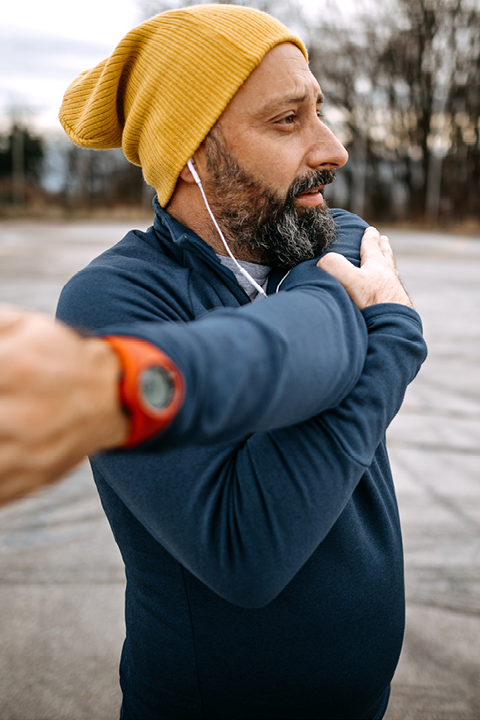10% off £25 OR 15% off £35
Code:DEAL

Unwind with our guide on how to relax, for stress and anxiety. Relaxation activities, stress-sleep solutions, and calming breathing exercises.
When work deadlines are looming, family and friends are asking for attention and your To-Do list is never-ending, taking time out to relax can seem like a sheer luxury.
But did you know that relaxation is actually essential for your health?1 Here, you’ll discover the ways that making time to relax can support your well-being, and some of the best techniques to help you unwind.
What is relaxation?
Relaxation is the release of muscle tension and a deep, restful state that has been shown to reduce the impact of stress on your mind and body2. It does this by having the following effects:3
- slowing your breathing
- lowering your heart rate and blood pressure
- relaxing muscles
- balancing blood sugar levels
- improving digestion
- boosting mood and concentration
- improving sleep quality
What happens if you don’t make time to relax?
If you rarely relax, your stress levels could continue to rise, leading to a range of symptoms including:
headaches4
- stomach upsets
- extreme tiredness
- sleep problems
- anxiety
Prolonged stress is linked to long-term health problems, such as high blood pressure, obesity, and diabetes, too.5

So, what stops us from relaxing?
The ‘fight or flight’ response to a stressful situation keeps your muscles tense, your heartbeat racing, and your body on high alert.6 To calm down from this state, you have to consciously take steps to soothe your nervous system – and that isn’t always easy in today’s busy modern world.5
A 2018 UK report by the Mental Health Foundation found that the top causes of stress include long-term health conditions, work, money worries, and social media.7
Another issue eating into our relaxation time is technology. More and more of us now find it tougher to switch off amid the pressure to always be online, instantly responding to messages, notifications, or emails.8
What are some proven ways to relax?
Many people unwind listening to relaxing music, while others can get lost in a good book, and although some of us may find activities like playing video games or watching TV can increase our stress levels, others say they release tension and aid relaxation.9
If you’re looking for proven ways to relax, research shows some specific techniques can activate your body’s relaxation response – they slow your heart rate and breathing and reduce your blood pressure.1
These techniques include:
- Slow breathing – this involves taking long, deep breaths while aiming to clear your mind of distracting thoughts.1 The NHS recommend breathing exercises for stress and anxiety, with some small studies show that those who practised 30 minutes of slow, deep breathing five times a week for three months, experienced reduced stress levels and lower blood pressure.10,11
- Meditation, especially mindfulness – try sitting comfortably with your eyes closed and pay attention to the present moment such as focusing on your breath. If your thoughts distract you, just let them go and return to your breath. Researchers have seen clear benefits of meditation for stress and anxiety, especially mindfulness meditation, which has been shown to lower stress levels, and manage symptoms of anxiety.12,13
- Guided imagery – for this technique, close your eyes and think of a scene or location which makes you feel very calm and relaxed.1 Researchers have found that guided imagery are a cost-effective and accessible method of calming anxiety and stress.14
If you’re not a fan of meditative techniques – and some people do find it stressful trying to follow them – then you could try something more practical instead, such as taking a warm bath or spending time outside in nature.15
How to relax your mind when you’re stuck at home
As social creatures, isolation in any form can be quite stressful for many of us, making it important to monitor your mental health.16 One useful thing you can do is learn how to relax your mind; knowing how to calm down those thoughts and relax can help to relieve feelings of anxiety and stress.14
We’ve put together some tips to help you do just that!
Stay active
Just because you’re stuck indoors, it doesn’t mean you can’t exercise. Why not browse the web for a fun dance routine, body-weight strength workout or relaxing yoga session? We have some suggestions if you're in need of some home exercise inspiration!
It’s been proven that exercising – however you want to do it – can help improve your mental health.17 Your self-esteem will be raised, you’ll experience setting goals and achieving them, and to top it all off: exercise causes chemical changes in your brain which can help to lift your mood.15
Top tip: It’s more important to find an activity you enjoy doing and are more likely to keep up than going for the ‘hardest’.

Write it down
Sometimes it can feel like our minds are going 100 mph, flitting from thought to thought erratically or overthinking a certain topic, especially when you’re on your own. How are you supposed to know what is really getting to you when you feel like this?
A great method to tackle these stressful thought processes is to write down what you’re thinking.18 Then, you can look at what you wrote down afterwards or even the next day to see if it was a valid issue for you to address or just a passing flit of anxiety.
Reach out to friends and family
Life can feel overwhelming if something bad happens or we’re forced to spend extended time by ourselves. However, sometimes all we need to do is talk to our loved ones to make everything seem that little bit lighter.19,20
Even the most introverted of us need contact with others, so don’t be afraid to pick up the phone. Who knows? They could be in a very similar situation to you, so you could be helping each other out.
How to relax your mind by getting a good night’s sleep
Catching enough good-quality ZZZs every night is beneficial for so many areas of health. One of these is our ability to deal with daily stresses, as when you’re tired, you’re more likely to get agitated.
A good 7-9 hours of sleep a night (depending on your age and other factors) is important for your mood - a lack of sleep can make staying happy and relaxed a real struggle.20
Hold on though, how are you supposed to sleep well if you’re stressed? Are we in some sort of catch-22 situation here? It can feel like that! Here are some ways to try and improve your sleep:22
- Stick to a regular bedtime
- Have a bath, do yoga, or any other relaxing activity to unwind before bed
- Keep your bedroom quiet, dark, and at a nice temperature – blackout curtains and earplugs can help
- Leave the TV, computer, and phone out of the bedroom – they can make it difficult to unwind
- Try sleep music – find a playlist of relaxing music or specifically designed calming music for sleep
- Avoid caffeine and nicotine, they could keep you up all night
- Lead an active lifestyle with regular exercise
- Try a guided sleep meditation – meditation for sleep has been shown to help you drift off13
- Consider lavender can help calm an active mind, help you relax and drift off for a lovely night’s sleep – and it smells pretty good too!
Relaxing podcasts for good mental health
From mindfulness and sleeping strategies to simple, light-hearted conversations to make us smile, these relaxing podcasts there are that have been designed to help get us through times just like these.
Meditation and mindfulness podcasts
Meditation and mindfulness techniques are widely recognised for their ability to relax the brain.12 By taking a step away from our busy or stressful lives, they introduce a sense of calm that leaves you in a better place to deal with the daily issues we face.

- The Wellness Edit - Unwind with Dr Gemma Newman as she joins industry experts, such as Dr Julie Smith, to tackle everyday issues to help you on your journey to wellness.
- Mindful - If you are new to this type of practice, Mindful is an excellent place to start. Most episodes are 10 minutes in length or less and, designed for modern life, cover different topics that help with being present.
- The Daily Meditation Podcast - These 20-minute daily meditations take you through different techniques to help you deal with the stresses of the day with calmness and positivity. Its recent releases on coping with uncertainty and times of crisis are particularly applicable for the current restrictions we are all facing.
- Headspace - Well-known for its award-winning app, this podcast introduces the experts behind the Headspace techniques, as well as speaking to inspiring guest speakers such as explorers, athletes, and scientists, who examine how the mind can drive us towards our goals.
Holistic therapy for relaxation
- The Tapping Solution - Tapping is a holistic healing tool, developed by clinical psychologists and used to reduce anxiety, calm the mind, and help us relax.23 The technique uses tapping patterns on nine acupressure points in the body, practised while focusing on your stress. This interrupts the brain’s pathway to these anxieties and allows for their release.22
Relaxing podcasts to help you sleep
With around 1 in 5 people in the UK struggling to sleep every night, finding effective techniques to help you switch off from the day, unwind and get that all-important rest is vital.24
These sleep-inducing podcasts may be the solution you are seeking.
Try combining them with a natural sleep or relaxation remedy to help maximise the benefits of your time asleep.
- The Sleepy Radio - You're never too grown-up for a good bedtime story, and when familiar tales are told in a low, rhythmical voice, like that of Otis Gray, you will struggle to reach the end before dropping off.
- Slow Radio - Slow radio plays lo-fi, calming, background sounds that help you to disconnect from everything that is going on in the outside world. Listen to the sounds of the sea, the mountains, or the countryside - a gentle, yet effective therapy for relaxation.
How often should I relax?
Ideally, set aside time to relax every day to help you manage your stress. Start with just a few minutes at a time, and then build up as you become more confident.
Choose a time of day when you’re not under pressure to do anything else and you won’t be interrupted. And remember, the more often you practice relaxation techniques, the more effective they will be.
Still can’t chill out?
If you feel constantly on edge, it’s important to speak to your GP who can check whether any physical symptoms of stress, such as headaches, a stomach upset or aching muscles, could have an underlying cause. They can also refer you to a counsellor or therapist if you’re experiencing anxiety or depression.
Looking for more relaxation activities and ways to unwind? Check out our article on 5 ways to improve your health and wellbeing.
The advice in this article is for information only and should not replace medical care. Please check with your GP or healthcare professional before trying any supplements, treatments, or remedies. Food supplements must not be used as a substitute for a varied and balanced diet and a healthy lifestyle.
Related Articles
Explore other areas
Sign up for exclusive offers
Plus, get expert advice to support your health & wellness straight to your inbox when you sign up to Holland & Barrett emails.
Read our
privacy policy














